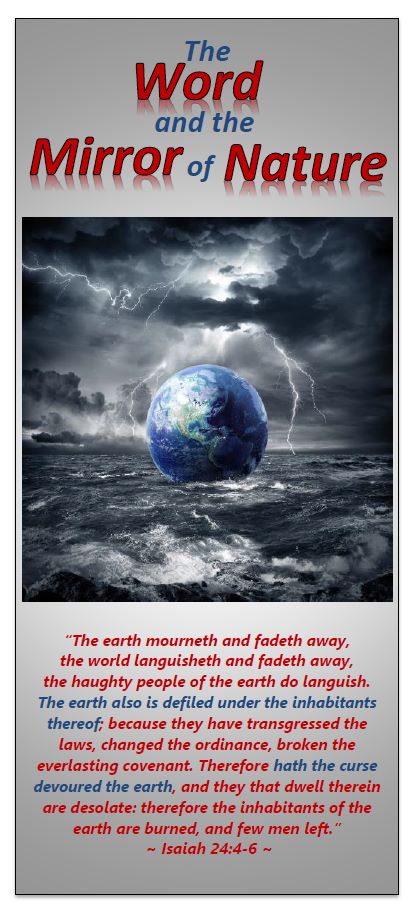(Isaiah 28:21) What is God’s “Strange Act”?
“For the LORD shall rise up as in mount Perazim, He shall be wroth as in the valley of Gibeon, that He may do His work, His strange work; and bring to pass His act, His strange act.” (Isaiah 28:21)
 One way that people have tried to resolve the tension between a loving and a vengeful God is to suggest that God is typically loving in nature, but in very extreme circumstances He will change for a brief moment in order to restore harmony to the Universe. This is referred to as His "strange work" or His "strange act". It is a work that appears strange to an otherwise loving God. On the other hand, such a work seems very natural to us. Enduring suffering from another person for a time and then lashing out in fury and wrath to destroy them is perfectly normal for humanity and is not strange at all – in fact, we call it justice.
One way that people have tried to resolve the tension between a loving and a vengeful God is to suggest that God is typically loving in nature, but in very extreme circumstances He will change for a brief moment in order to restore harmony to the Universe. This is referred to as His "strange work" or His "strange act". It is a work that appears strange to an otherwise loving God. On the other hand, such a work seems very natural to us. Enduring suffering from another person for a time and then lashing out in fury and wrath to destroy them is perfectly normal for humanity and is not strange at all – in fact, we call it justice.
One thing for sure, fallen man’s perception of anger and wrath is completely opposite to God’s:
“You must understand this, my dear brothers. Everyone should be quick to listen, slow to speak, and slow to get angry. For human anger does not produce the righteousness that God desires. Therefore, rid yourselves of everything impure and every expression of wickedness, and with a gentle spirit welcome the word planted in you that can save your souls.” (James 1:19-21)
 So, is this “strange act” of God something He does that is out of character, but would be very natural for us to do? Does He become like men in order to deal with His enemies? This concept in itself is strange. Christ calls Satan a murderer from the beginning (John 8:44). Does God have the final word by becoming the murderer in the end?
So, is this “strange act” of God something He does that is out of character, but would be very natural for us to do? Does He become like men in order to deal with His enemies? This concept in itself is strange. Christ calls Satan a murderer from the beginning (John 8:44). Does God have the final word by becoming the murderer in the end?
Once a man kills another man he is considered a murderer till the end of His life. Having once engaged in the act of murder, it becomes a part of his character. He may repent and be sorry and ask forgiveness and change his ways, but he still murdered, and therefore is known as a man who murdered. How does this impact the eternal God, the One who never dies?
How can it be said that the last enemy to be conquered is death (1 Corinthians 15:26) if death sits upon the throne? Does not death then triumph?
By Beholding We Are Changed
 As the saved inhabitants of the Universe behold a picture of God as one who raises His mighty arm against His enemies to personally kill them, could He decide to do it again in the future? And if death in the person of God reigns upon the throne, then in beholding such a God would we not be transformed into the same image?
As the saved inhabitants of the Universe behold a picture of God as one who raises His mighty arm against His enemies to personally kill them, could He decide to do it again in the future? And if death in the person of God reigns upon the throne, then in beholding such a God would we not be transformed into the same image?
“But we all, with open face beholding as in a glass [mirror] the glory [character] of the Lord, are changed into the same image from glory to glory, even as by the Spirit of the Lord.” (2 Corinthians 3:18)
What do we behold when we look into the eyes of the Lord by faith? Do we see death in His Person? Do we see a sword in His hand raised to slay the rebellious? Then in beholding this, we shall do and preach likewise. Pastors and teachers preach condemnation and “fire and brimstone” because that’s how they view God and His Son. The sad result of this is a people whose obedience is not based on love and faith, but fear. Obedience becomes more of an obligation to a God with a set of rules and if we disobey these rules God is obligated to punish us, torture us, and even kill us. Does this not come to the very center of the human dilemma; we die because we behold death in the God we believe in? Think it through carefully. Have we become like the people of Israel who believed God brought them out of Egypt and into the wilderness to kill them?
“And all the children of Israel murmured against Moses and against Aaron: and the whole congregation said unto them, Would God that we had died in the land of Egypt! or would God we had died in this wilderness! And wherefore hath the LORD brought us unto this land, to fall by the sword, that our wives and our children should be a prey? were it not better for us to return into Egypt?” (Numbers 14:2, 3)
“And the people spake against God, and against Moses, Wherefore have ye brought us up out of Egypt to die in the wilderness? for there is no bread, neither is there any water; and our soul loatheth this light bread.” (Numbers 21:5)
Because of their constant complaining about this, God gave them over to their own thoughts:
“How long shall I bear with this evil congregation, which murmur against Me? I have heard the murmurings of the children of Israel, which they murmur against Me. Say unto them, As truly as I live, saith the LORD, as ye have spoken in Mine ears, so will I do to you: Your carcasses shall fall in this wilderness; and all that were numbered of you, according to your whole number, from twenty years old and upward, which have murmured against Me.” (Numbers 14:27-29)
The phrase, “will I do to you” does not mean God will kill them if they keep complaining. He is simply giving them over to the words they have repeatedly spoken in His ear. He permitted the expression of death inside them to flourish and would allow them to believe He was killing them. Like the Israelites in the wilderness who believed God wanted to kill them, we also die because we believe in a God of death and destruction. Have we not inherited this from our first parents? How did they interpret the following words …
“But of the tree of the knowledge of good and evil, thou shalt not eat of it: for in the day that thou eatest thereof thou shalt surely die.” (Genesis 2:17)
Do we read this to mean that “If you touch My tree, I will kill you!” or could this possibly be read this way:
“In choosing to take an action outside of My design for life, you believe that I do not have your best interest at heart, and as I am your only life, (Deuteronomy 30:20; Colossians 3:4), in turning from Me you are inherently turning towards death.”
Through Solomon, Christ expressed it this way:
“But he that sinneth against Me wrongeth his own soul: all they that hate Me love death.” (Proverbs 8:36)
will kill the transgressor, man enthroned death and crowned its author
Satan with the rulership of the Universe
 The tree with the forbidden fruit was planted in the Garden of Eden to reveal to us that God has given us all free choice. We are free to obey God or to disobey God, but each choice comes with inherent (natural) consequences. The natural consequence of obedience is life, the natural consequence of disobedience (sin) is death. God does not need to kill the persistent sinner who is on a path that automatically leads to death. How cruel would it be for God to tell Adam and Eve that they could exercise their free choice to eat from any tree they wanted to, but then get angry with them when they don’t choose the tree He wanted them to choose and say, “Because you chose to eat from that tree, I’m going to kill you!”
The tree with the forbidden fruit was planted in the Garden of Eden to reveal to us that God has given us all free choice. We are free to obey God or to disobey God, but each choice comes with inherent (natural) consequences. The natural consequence of obedience is life, the natural consequence of disobedience (sin) is death. God does not need to kill the persistent sinner who is on a path that automatically leads to death. How cruel would it be for God to tell Adam and Eve that they could exercise their free choice to eat from any tree they wanted to, but then get angry with them when they don’t choose the tree He wanted them to choose and say, “Because you chose to eat from that tree, I’m going to kill you!”
The writer of the letter to the Hebrews tells us that it’s the devil who “has the power of death” (Hebrews 2:14). The King James Version says “had” but the Greek is in the present participle tense here.
Every time we attribute the desire to kill to God, we ensure our own destruction for by beholding we are changed. Every sinner carries the knowledge in himself that he is worthy of death.
“And even as they did not like to retain God in their knowledge, God gave them over to a reprobate mind, to do those things which are not convenient; Being filled with all unrighteousness, fornication, wickedness, covetousness, maliciousness; full of envy, murder, debate, deceit, malignity; whisperers, Backbiters, haters of God, despiteful, proud, boasters, inventors of evil things, disobedient to parents, Without understanding, covenantbreakers, without natural affection, implacable, unmerciful: Who knowing the judgment of God, that they which commit such things are worthy of death, not only do the same, but have pleasure in them that do them.” (Romans 1:28-32)
Deep down inside we know that as sinners we are worthy of death, and our often self-destructive lives reveal this. Yet, in our rebellious minds we attribute death to a work that God does, when in fact it is the work of sin:
“But every man is tempted, when he is drawn away of his own lust, and enticed. Then when lust hath conceived, it bringeth forth sin: and sin [not God], when it is finished, bringeth forth death.” (James 1:14, 15)
Instead of accepting that it is our sin that brings death, we choose rather to believe that God brings forth death and therefore can form a grudge against Him and become reprobate in our minds. In refusing to accept that death is completely his own doing, man shifts the work of destruction from himself to God. This kind of thinking actually creates in our minds a false god, a false idol. Thus we enthrone in our minds this idol and pass this idolatry to the next generation so they also can worship death and die. God is the author of life only. Satan is the author of death.
“The LORD Shall Rise Up”
We note that the rising up of the Lord in Isaiah 28:21 is a rising up to defend His people against those who wish to destroy them. This point is also mentioned in Daniel 12:
“And at that time shall Michael stand up, the great prince which standeth for the children of thy people: and there shall be a time of trouble, such as never was since there was a nation even to that same time: and at that time thy people shall be delivered, every one that shall be found written in the book.” (Daniel 12:1)
So, this strange work that is performed relates to a work of protection for God’s people during “a time of trouble.” This again is mentioned in the book of Revelation when John sees four angels hold back the four winds until the servants of God are sealed in their foreheads (Revelation 7:1-4). This seal represents the self-sacrificing, non-violent “name” (character) of God and His Son as revealed in God’s Law of love (Isaiah 8:16) which will be imparted in the believer (Revelation 14:1, 12, Hebrews 8:10). Anyone rejecting the seal (the true character of God) will be unsheltered from divine grace and have no protection from the wicked one whose character they emulate. Satan will then plunge the inhabitants of the earth into one great, final trouble.
“Mount Perazim”
Mount Perazim is possibly the same as ‘Baal-Perazim’ which was the scene of a victory of David over the Philistines located in the valley of Rephaim, south of Jerusalem, on the road to Bethlehem (see, 2 Samuel 5:17-21). This literal event of history gives us the clues we need to spiritually understand the prophecy of our text in question.
 The word perazim means “breaches” like a breach of a wall. David had said, “The LORD hath broken forth upon mine enemies before me, as the breach of waters. Therefore, he called the name of that place Baal-perazim” (2 Samuel 5:20). In the book of John, we see that water represents God’s Spirit:
The word perazim means “breaches” like a breach of a wall. David had said, “The LORD hath broken forth upon mine enemies before me, as the breach of waters. Therefore, he called the name of that place Baal-perazim” (2 Samuel 5:20). In the book of John, we see that water represents God’s Spirit:
“In the last day, that great day of the Feast, Jesus stood and cried, saying, If any man thirst, let him come unto Me, and drink. He that believeth on Me, as the scripture hath said, out of His belly shall flow rivers of living water. (But this spake He of the Spirit, which they that believe on Him should receive: for the Holy Spirit was not yet given; because that Jesus was not yet glorified.)” (John 7:37-39)
Therefore, the breach of water in the prophecy represents a withdrawal of the Spirit of God. When God withdraws His Spirit, it creates a gap in the hedge of protection. When the Philistines heard the sound like thunder through the tops of the mulberry trees it put them into a terror.
"And it shall be, when you hear the sound [to call, voice, thunder, yell] of marching in the tops of the mulberry trees, then you shall advance quickly. For then the Lord will go out before you to strike the camp of the Philistines.” (2 Samuel 5:24)
The way God would “strike” them is that due to the absence of His Spirit (presence), a great fear would overwhelm the Philistines. The Captain of the Lord’s host had spoken the Word for the angels to depart from protecting the Philistines. The thunder of marching in the tops of the trees terrified them and caused great confusion. God had no intention to strike them with a literal sword as David commanded.
Once Israel took the sword, the Lord still worked with them despite this failure. The Lord did not cast off Abraham when he took Hagar as his second wife even though it caused great problems down to this very day. Even though David commanded the use of the sword, God still worked with him because He knew this practice had been inherited from the days of Abraham when he saved his nephew Lot. Later on however, God revealed to David that he was not able to build the house of God (the Temple) because he was a man of blood:
“But the word of the LORD came to me (David), saying, Thou hast shed blood abundantly, and hast made great wars: thou shalt not build an house unto My name, because thou hast shed much blood upon the earth in My sight.” (1 Chronicles 22:8)
It would be a mistake to assume that when a person is given divine aid that it validates all his actions. David was threatened with extermination by the Philistines and the Lord stood up to help him; yet, it was not until Christ came to this earth that the sword was removed from the true Church of God when Christ stated:
“Then said Jesus unto him (Peter), Put up again thy sword into his place: for all they that take the sword shall perish with the sword.” (Matthew 26:52)
Christ has replaced the literal sword in our hand with "the sword of the Spirit, which is the Word of God." (Ephesians 6:17). Centuries of Israelite history made it hard for the disciples to understand Christ’s teaching. They had created another god in their minds and “God overlooked (winked at) people’s ignorance about these things in earlier times, but now He commands everyone to repent of their sins and turn to Him” (Acts 17:30). For more info concerning the sword, please see the article entitled: Didn’t God Command the Israelites to Slaughter Men, Women, and Children With the Sword?
The key point about Perazim is there was a breach of the waters indicating a withdrawal of the Spirit of God by the command of God. Let’s read and see what causes this breach in the wall:
“Now go, write it before them in a table, and note it in a book, that it may be for the time to come for ever and ever: That this is a [1] rebellious people, [2] lying children, [3] children that will not hear the Law of the LORD: [4] Which say to the seers, See not; and to the prophets, Prophesy not unto us right things, speak unto us smooth things, prophesy deceits: Get you out of the way, turn aside out of the path, cause the Holy One of Israel to cease from before us. Wherefore thus saith the Holy One of Israel, [5] Because ye despise this word, and trust in oppression and perverseness, and stay thereon: Therefore this iniquity shall be to you as a breach ready to fall, swelling out in a high wall, whose breaking cometh suddenly at an instant. And He shall break it as the breaking of the potters' vessel that is broken in pieces; He shall not spare: so that there shall not be found in the bursting of it a sherd to take fire from the hearth, or to take water withal out of the pit.” (Isaiah 30:8-14)
Here we see that the main reason for the breach is the people’s desire for “the Holy One of Israel to cease from before us.”
reaps what they have sown
This is exactly what happened to the people living just before the Flood who demanded God to “Depart from us!” (Job 22:15-17). For more info on the Flood, please see the article entitled: Did God Really Drown Millions of People in the Flood?
“He Shall Be Wroth”
This is why God said:
“And I sought for a man among them, that should make up the hedge, and stand in the gap before Me for the land, that I should not destroy it: but I found none. Therefore have I poured out My indignation upon them; I have consumed them with the fire of My wrath …” (Ezekiel 22:30, 31a)
First, notice that God is looking for someone to stand in the breach. He cannot find any man, and this is why Jesus had to come and arise up and stand in that gap. He is the only Being who can reveal God’s true character because He is the only begotten Son of God who is “the brightness of His (God’s) glory (character), and the express image of His person” (Hebrews 1:3). Jesus said, “If you’ve seen Me, you’ve seen the Father” (John 14:9). Jesus and His Father act the same. Jesus always acts godly, and the Father always acts Christ-like.
Second, God says, “Therefore have I poured out My indignation upon them; I have consumed them with the fire of My wrath.” I cut off the last part of the sentence on purpose. Why? Because we most often dwell on the first part alone and conclude that God is the One responsible for killing millions of people because of His wrath and indignation and executing divine justice. However, the last part of the sentence tells us exactly how God’s wrath and indignation work:
“… their own way have I recompensed upon their heads, saith the Lord GOD.” (Ezekiel 22:31b)
Is it possible that we have interpreted God’s anger as we would be angry when people reject us and treat us badly? One Hebrew word for “anger” is אַף (af) which means:
“Properly the nose or nostril; hence the face, and occasionally a person; also (from the rapid breathing in passion) ire: - anger (-gry), + before, countenance, face, + forbearing, forehead, + [long-] suffering, nose, nostril, snout, X worthy, wrath.” (Strong’s Concordance)
The word for anger means nose or nostril in the sense of rapid breathing from intensity of feeling. This can be either anger or grief in the form of long suffering. This same word is used as follows:
“And the LORD passed by before him, and proclaimed, The LORD, The LORD God, merciful and gracious, long suffering (af), and abundant in goodness and truth.” (Exodus 34:6)

Can you imagine our dear heavenly Father coming to the point where He knows the time has come to let the people have their own will? As He issues the command, His breath in His nostrils increases in the grief of knowing that these people are going to suffer at the hands of Satan and his angels. Yet, He must respect their choice and allow them to have the master they have chosen.
“Know ye not, that to whom ye yield yourselves servants to obey, his servants ye are to whom ye obey; whether of sin unto death, or of obedience unto righteousness?” (Romans 6:16)
"Cast away from you all your transgressions, whereby ye have transgressed; and make you a new heart and a new spirit: for why will ye die, O house of Israel? For I have no pleasure in the death of him that dieth, saith the Lord GOD: wherefore turn yourselves, and live ye." (Ezekiel 18:31, 32)
As we come back to Isaiah 28:21 we get the same thought expressed through the word wroth.
“Wroth (râgaz). A primitive root; to quiver (with any violent emotion, especially anger or fear): - be afraid, stand in awe, disquiet, fall out, fret, move, provoke, quake, rage, shake, tremble, trouble, be wroth.” (Strong’s Concordance)
“Moved, disturbed, to be moved with grief.” (Gensenius Hebrew Lexicon)
We see this definition in 2 Samuel 18:33 where the same word is used in the sense of "moved with grief":
"Then the king was deeply moved [râgaz], and went up to the chamber over the gate, and wept. And as he went, he said thus: 'O my son Absalom—my son, my son Absalom—if only I had died in your place! O Absalom my son, my son!'”
This should remind us of Jesus when He overlooked Jerusalem and wept:
“Jerusalem, Jerusalem, killing the prophets and stoning those having been sent to her! How often would I have gathered together your children, the way in which a hen gathers together her chicks under the wings, and you were not willing!” (Matthew 23:37, Berean Literal Bible)
Or the time when Jesus “looked about on them [the Pharisees] with anger, being grieved for the hardness of their hearts” (Mark 3:5). This is the type of wroth or quivering of God as manifested in His Son. It is not a God quivering with vengeful rage, but a heartbroken Father bowed down with grief.
“How can I give you up, Ephraim? How can I surrender you, Israel? How can I make you like Admah? How can I treat you like Zeboiim? My heart is turned over within Me, All My compassions are kindled. (Hosea 11:8, New American Standard Bible).
The Hebrew word for wroth allows the reader to determine what is the quivering of God. The Son of God reveals that it is the quivering of grief and anguish for the lost.
“In the Valley of Gibeon”
The story of Gibeon is recorded in Joshua 10:5-13. Let’s read verses 10 and 11:
“And the LORD discomfited [disturbed] them (the Amorites) before Israel, and slew them with a great slaughter at Gibeon, and chased them along the way that goeth up to Bethhoron, and smote them to Azekah, and unto Makkedah. And it came to pass, as they fled from before Israel, and were in the going down to Bethhoron, that the LORD cast down great stones from heaven upon them unto Azekah, and they died: they were more which died with hailstones than they whom the children of Israel slew with the sword.” (Joshua 10:10, 11)
Did the Lord Himself directly throw down hail stones upon the Amorites killing them? Or is this just another example of the well-known Hebrew idiom where God is said to “do” something that He only “permits” to be done? Notice the parallel thought in these verses from the book of Psalms referring to the plagues of Egypt:
“He (God) destroyed their vines with hail, and their sycomore trees with frost. He gave up their cattle also to the hail, and their flocks to hot thunderbolts. He cast upon them the fierceness of His anger, wrath, and indignation, and trouble … [how?] by sending (releasing/permitting) evil angels among them.” (Psalm 78:47-49)
The descent of the hail is parallel to the sending or releasing of evil angels. Obviously, God and evil angels are not working together. Again, we see that God’s “anger, wrath, and indignation” is expressed by Him reluctantly and tearfully giving them over to their own ways. In this case He withdrew His protective presence at their request, thus giving them over to evil angels who were waiting to seize their prey.
This literal event in history will be repeated spiritually. Through the prophet Ezekiel, God again speaks of the breach in the wall:
“Because, even because they have seduced My people, saying, Peace; and there was no peace; and one built up a wall, and, lo, others daubed it with untempered mortar: Say unto them which daub it with untempered mortar, that it shall fall: there shall be an overflowing shower; and ye, O great HAILSTONES, shall fall; and a stormy wind shall rend it.” (Ezekiel 13:1-11)
These false prophets and teachers who are speaking lies according to their own hearts have daubed the protective wall with untempered mortar. The word “untempered” means, “not brought to a proper consistency or hardness.” Other translations say they have plastered it with whitewash. Ezekiel is rebuking the preaching of a watered-down gospel. The whitewashed wall might look solid from the outside, but without the mortar it has no real strength. Jesus lovingly rebuked the Pharisees of His day saying:
“Woe unto you, scribes and Pharisees, hypocrites! for ye are like unto whited sepulchres, which indeed appear beautiful outward, but are within full of dead men's bones, and of all uncleanness. Even so ye also outwardly appear righteous unto men, but within ye are full of hypocrisy and iniquity.” (Matthew 23:27, 28)
The rain of hail will wash away and expose the whitewashed lies. God has said:
“… I will make justice the measuring line, and righteousness the plummet; The hail will sweep away the refuge of lies, And the waters will overflow the hiding place” (Isaiah 28:17, New King James Version)
So, what does the hail represent? One must ask, “What washes away lies?” Is it not the TRUTH? A hailstorm of truth will fall from heaven washing away and exposing the whitewashed lies. So when the Lord discomforted the Amorites, He was making one final effort to reach them and encourage them to confess their sins; yet, they remained in rebellion, stiffened their necks, and gave Satan full control to destroy them physically.
As we read Scripture masked by Satan’s cruelty, we do not see a Father making a last effort to save but an angry God set on vengeance, death, and destruction.
If we read this story and are left with the thought that God personally destroyed the Amorites, then we seat death on the throne in our minds and Satan achieves his goal of bringing death to those who worship such a God of death and destruction.
God’s Strange Act
With all these thoughts in mind we are now ready to examine the meaning of God’s strange act. The first use of the word strange in Isaiah 28:21 is given the following meaning Hebrew:
“Zûr. A primitive root; to turn aside (especially for lodging); hence to be a foreigner, strange, profane; specifically (active participle) to commit adultery: - (come from) another (man, place), fanner, go away, (e-) strange (-r, thing, woman).” (Strong’s Concordance)
“To turn aside. To depart. To turn from the way. To be a stranger.” (Gesenius’ Hebrew-Chaldee Lexicon)
The strange work of God is not that He personally raises His fist and smashes His enemies. The strange work is that He turns aside and allows a breach to be made in His Spirit. He allows Himself to become a stranger according to the desire of the sinner.
“To the pure, You show Yourself pure, and to the morally corrupt, You appear to be perverse.” (Psalm 18:26, International Standard Version)
The second word for strange is a different Hebrew word. It gives the sense of something foreign.
“Nokrı̂y. Strange, in a variety of degrees and applications (foreign, non-relative, adulterous, different, wonderful): - alien, foreigner, outlandish, strange (-r, woman).” (Strong’s Concordance)
It is completely foreign for the Lord to turn aside and become a stranger to His children. After years of reaching out to a group of people He finally withdraws His Spirit. This action causes Him to quiver in grief and sorrow as we saw in the life of Christ when He lamented over Jerusalem. He wanted to gather them as a hen gathers her chickens, but they refused.
It is not strange for us to express anger by lashing out upon the one who’s offending us, but it is strange to us that godly anger is not lashing out, but turning aside. The “golden rule” built by design within God’s Law to always treat others as you want to be treated even when they are mistreating us is strange to our fallen minds.
“I have written for him the great things of My Law, But they were considered a strange thing.” (Hosea 8:12)
which will punish sin with sin
“Evil shall slay the wicked: and they that hate the righteous shall be desolate.” (Psalm 34:21)
Whatever we understand the Bible to teach, we must harmonize what we know of the character of God in the light of its perfect revelation in the person of Jesus Christ. Jesus continually had difficulty expressing spiritual truths to people because they continued to lock onto the physical and would not progress into its deeper meaning. (See John 6:51-66 for one example of this).
 Who is the God that sits upon the throne of our hearts? Is the God you serve a person who is personally responsible for the death of millions of people? Has violence become a part of the God you worship? If death currently sits upon the throne, then death will be eternal for God is eternal. God’s “strange act” is not strange for Him. He is not acting out of character because God never changes (Malachi 3:6). God’s “strange act” of turning aside, not lashing out at the offender but giving them over to their own destructive ways is strange to us. Why? Because “the carnal mind is enmity (hostile) against God: for it is not subject (submissive) to the Law of God, neither indeed can be” (Romans 8:7). Thus “to be carnally minded is death; but to be spiritually minded is life and peace” (Romans 8:6).
Who is the God that sits upon the throne of our hearts? Is the God you serve a person who is personally responsible for the death of millions of people? Has violence become a part of the God you worship? If death currently sits upon the throne, then death will be eternal for God is eternal. God’s “strange act” is not strange for Him. He is not acting out of character because God never changes (Malachi 3:6). God’s “strange act” of turning aside, not lashing out at the offender but giving them over to their own destructive ways is strange to us. Why? Because “the carnal mind is enmity (hostile) against God: for it is not subject (submissive) to the Law of God, neither indeed can be” (Romans 8:7). Thus “to be carnally minded is death; but to be spiritually minded is life and peace” (Romans 8:6).
If God is love, mercy, and grace, and His justice is revealed in allowing His subjects to receive the fruits of their own hands then, indeed, the last enemy to be conquered is death (1 Corinthians 15:26).
When the last message of mercy concerning the character of God is revealed, death will be removed from the throne of the Universe in our minds, and we will “serve Him without fear” (Luke 1:74); for “God has not given us a spirit of fear” (2 Timothy 1:7).




.jpg)

